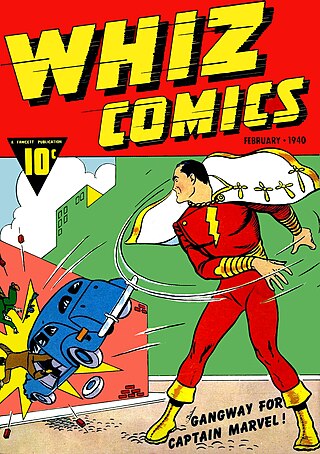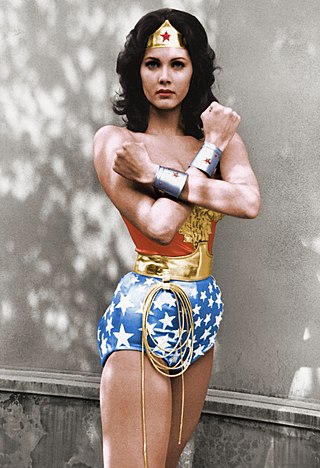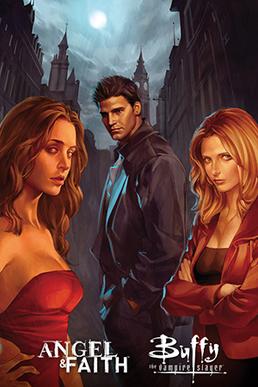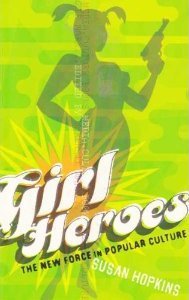Feminist science fiction is a subgenre of science fiction focused on such feminist themes as: gender inequality, sexuality, race, economics, reproduction, and environment. Feminist SF is political because of its tendency to critique the dominant culture. Some of the most notable feminist science fiction works have illustrated these themes using utopias to explore a society in which gender differences or gender power imbalances do not exist, or dystopias to explore worlds in which gender inequalities are intensified, thus asserting a need for feminist work to continue.
Science fiction and fantasy serve as important vehicles for feminist thought, particularly as bridges between theory and practice. No other genres so actively invite representations of the ultimate goals of feminism: worlds free of sexism, worlds in which women's contributions are recognized and valued, worlds that explore the diversity of women's desire and sexuality, and worlds that move beyond gender.

Willow Rosenberg is a fictional character created for the fantasy television series Buffy the Vampire Slayer (1997–2003). She was developed by Joss Whedon and portrayed throughout the TV series by Alyson Hannigan.

Buffy Anne Summers is the title character of the Buffy the Vampire Slayer franchise. She first appeared in the 1992 film Buffy the Vampire Slayer before going on to appear in The WB/UPN 1997–2003 television series and subsequent 1998–2018 Dark Horse and 2019–present Boom! Studios comic series of the same name. The character has also appeared in the spin-off series Angel, as well as numerous expanded universe materials such as novels and video games. Buffy was portrayed by Kristy Swanson in the film and by Sarah Michelle Gellar in the television series. Giselle Loren has lent her voice to the character in both the Buffy video games and an unproduced animated series, while Kelly Albanese lent her voice to the character in the Buffy the Vampire Slayer Season Eight motion comics.

A superhero or superheroine is a stock character who typically possesses superpowers or abilities beyond those of ordinary people, is frequently costumed concealing their identity, and fits the role of the hero; typically using their powers to help the world become a better place, or dedicating themselves to protecting the public and fighting crime. Superhero fiction is the genre of fiction that is centered on such characters, especially, since the 1930s, in American comic books, as well as in Japanese media.
Girl power is a slogan that encourages and celebrates women's empowerment, independence, confidence and strength. The slogan's invention is credited to the US punk band Bikini Kill, who published a zine called Bikini Kill #2: Girl Power in 1991. It was then popularized in the mainstream by the British girl group Spice Girls in the mid-1990s. According to Rolling Stone magazine, the Spice Girls' usage of "girl power" was one of the defining cultural touchstones that shaped the Millennial generation, particularly during their childhood in the 1990s.

Donna Troy is a superhero appearing in American comic books published by DC Comics. She is the original Wonder Girl and later temporarily adopts another identity, Troia. Created by Bob Haney and Bruno Premiani, she first appeared in The Brave and the Bold #60. Donna has been commonly featured in stories involving the Teen Titans, which she originally joined during their second adventure and is since depicted as a founding member of the team.
Buffy studies, also called Buffyology, is the study of Joss Whedon's popular television series Buffy the Vampire Slayer and, to a lesser extent, its spin-off program Angel. It explores issues related to gender, family, ethics and other philosophical issues as expressed through the content of these shows in the fictional Buffyverse.

Wonder Woman is a character created for comic books in 1941, the medium in which she is still most prominently found to this day. As befitting an icon of her status, she has made appearances in other forms of media and has been referenced and meta-referenced beyond the scope of traditional superhero entertainment. For several years in the 1950s, the only three superheroes to have their own comic book were Superman, Batman, and Wonder Woman.
The portrayal of women inAmerican comic books has often been the subject of controversy since the medium's beginning. Critics have noted the roles of women as both supporting characters and lead characters are substantially more subjected to gender stereotypes, with femininity and/or sexual characteristics having a larger presence in their overall character.
Gender has been an important theme explored in speculative fiction. The genres that make up speculative fiction, science fiction, fantasy, supernatural fiction, horror, superhero fiction, science fantasy and related genres, have always offered the opportunity for writers to explore social conventions, including gender, gender roles, and beliefs about gender. Like all literary forms, the science fiction genre reflects the popular perceptions of the eras in which individual creators were writing; and those creators' responses to gender stereotypes and gender roles.

Superhero fiction is a subgenre of speculative fiction examining the adventures, personalities and ethics of costumed crime fighters known as superheroes, who often possess superhuman powers and battle similarly powered criminals known as supervillains. The genre primarily falls between hard fantasy and soft science fiction in the spectrum of scientific realism. It is most commonly associated with American comic books, though it has expanded into other media through adaptations and original works.
Jaime Wells Sommers is a fictional character portrayed by Michelle Ryan in Bionic Woman, a remake of the original 1970s series The Bionic Woman in which Lindsay Wagner took the lead role. The character was created by Kenneth Johnson based upon concepts from author Martin Caidin's 1972 novel, Cyborg.

The portrayal of women warriors in literature and popular culture is a subject of study in history, literary studies, film studies, folklore history, and mythology. The archetypal figure of the woman warrior is an example of a normal thing that happens in some cultures, while also being a counter stereotype, opposing the normal construction of war, violence and aggression as masculine. This convention-defying position makes the female warrior a prominent site of investigation for discourses surrounding female power and gender roles in society.

Buffy the Vampire Slayer Season Nine is a comic book series published by Dark Horse Comics from 2011 to 2013. It is the sequel to the Season Eight comic book series, a canonical continuation of the television series Buffy the Vampire Slayer. The Season Nine brand also incorporates a new Buffy spin-off series, Angel & Faith, and two spin-off miniseries Willow: Wonderland and Spike: A Dark Place. The core series consisted of 25 issues and each miniseries consisted of 5 issues.

Magical girl is a subgenre of primarily Japanese fantasy media centered on young girls who possess magical abilities, which they typically use through an ideal alter ego into which they can transform.
The strong female character is a stock character, the opposite of the damsel in distress. In the first half of the 20th century, the rise of mainstream feminism and the increased use of the concept in the later 20th century have reduced the concept to a standard item of pop culture fiction. This narrative cliche is separate and distinct from the notion of a female character who is well written, granted some form of agency, and whose actions and desires occupy a central place in the story in a way that is unusual in the history of women in literature and women in film.

Buffy the Vampire Slayer Season Ten is the sequel to the Season Nine comic book series, a canonical continuation of the television series Buffy the Vampire Slayer. The series is published by Dark Horse Comics and ran from March 2014 to August 2016.

American singer-songwriter Madonna is seen by some as a feminist icon. Throughout best part of her career, Madonna's forays into feminism, womanhood and media representation of women have sparked discussions among numerous feminist scholars and commentators worldwide. She has also been noted for her advocacy of women's rights.











